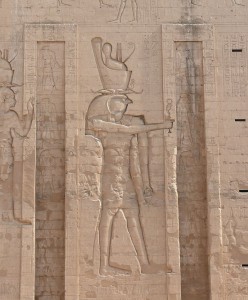Having a complete sense of cause and effect helps people navigate through the world by being able to make accurate predictions as to the effects of actions and events. In some cases, such as explaining cycling of the heavenly bodies, the changing seasons, harmful diseases, and even the movements and actions of living beings, early humans living in a prescientific world couldn’t complete their sense of cause and effect through natural processes. Instead they overcame that deficiency by evoking superstitions – a belief in supernatural causality.
Superstition

Early religions personified these supernatural agents as souls, spirits, and eventually gods and these agents caused, intervened, and acted on worldly events. In order to make these supernatural agents more meaningful and memorable a multitude of stories were built up around them. Before the invention of writing, the stories of souls, spirits, gods and their deeds were passed down from generation to generation orally. Eventually some of those stories were written down. It is an exercise in futility to go through all of the gods that humanity has created since there have been tens of thousands of them. We know today, of course, that all of them are imaginary. As Richard Dawkins points out: “We are all atheists about most of the gods that humanity has ever believed in. Some of us just go one god further.”
Spirituality
Superstition was supplemented by spirituality – a connection with the divine. A connection with the divine was doubtless perceived through altered states of consciousness in states of dreams, hallucinations, and trances. These altered states of consciousness helped lead to the widespread belief in the duel nature of beings – that the mind was separate from and could exist independently of the body. This further implied the existence of a soul or spirit as an animating force that could be applied to people, and by logic also extended to other animals and plants, and even objects such as rocks, rivers, clouds and stars.
Sir Edward Tylor, the father of modern social anthropology, called this belief that nature had an animating soul or spirit animism, vaulting the hitherto obscure term to prominence in his 1871 book Primitive Culture. He believed that animism was the first phase in the evolution of religions and argued that people originally used religion to explain phenomena in the natural world. According to Tylor, animism easily answers many questions early humans had such as what happens when we dream. Souls wandering out of the body in some cases, or neighboring souls visiting the body in other cases provided a plausible answer.
Invoking souls, spirits, and eventually gods allowed early humans to complete their sense of cause and effect about how the world worked. This is not to say their sense of cause and effect was correct, but it was now at least complete. With a complete set of beliefs about how the world supposedly worked, the next step was to try to begin to cooperate with and influence the world in order to achieve desired goals. The methods thought to accomplish this task include rituals, prayer, and other means which we will look at next.
Further reading: The Dominate Animal by Paul and Anne Ehrlich; Breaking the Spell by Daniel Dennett; The God Delusion by Richard Dawkins; The Evolution of God by Robert Wright